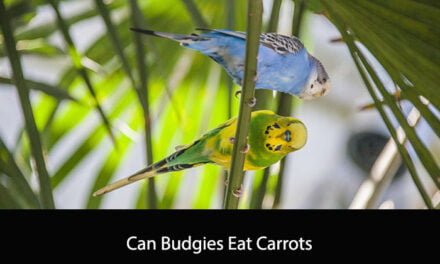Tortoises are known for their herbivorous diet, which includes a variety of leafy greens. Collard greens are a popular choice for many tortoise owners due to their nutritional value. However, before feeding your tortoise collard greens, it is important to understand if they are safe and healthy for them to consume.
Collard greens are a member of the Brassica family, which includes other vegetables such as broccoli and cabbage. These vegetables contain compounds called goitrogens, which can interfere with the thyroid gland’s ability to produce hormones. While goitrogens can be beneficial in small amounts, excessive consumption can lead to thyroid problems in tortoises. Therefore, it is important to understand the appropriate amount of collard greens that should be included in your tortoise’s diet.
What Are Collard Greens?

Collard greens are leafy vegetables that belong to the Brassica family, which also includes broccoli, cauliflower, and kale. They are a common vegetable in Southern cuisine and are often used in stews, soups, and side dishes. Collard greens have a slightly bitter taste and are known for their dark green, thick leaves.
Collard greens are a good source of vitamins and minerals, including vitamin A, vitamin C, calcium, and iron. They are also low in calories and high in fiber, making them a healthy addition to any diet.
When feeding collard greens to tortoises, it is important to wash them thoroughly and remove any stems or tough parts. While collard greens are generally safe for tortoises to eat, they should be fed in moderation as they contain high levels of oxalates which can interfere with calcium absorption. It is recommended to rotate collard greens with other leafy greens to provide a balanced diet for your tortoise.
Understanding Tortoise Diet
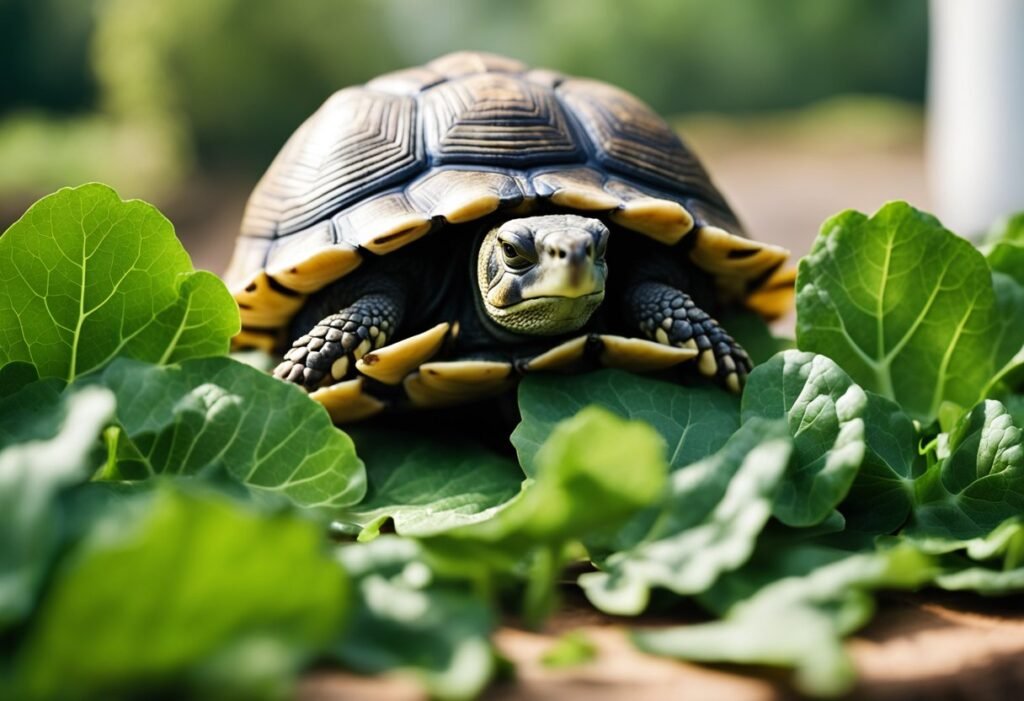
When it comes to feeding tortoises, it is important to know what they eat in the wild. Tortoises are herbivores and their diet consists mainly of grasses, leaves, and flowers. They also need a variety of nutrients such as calcium, vitamin D3, and fiber to maintain good health.
In captivity, it can be challenging to provide a balanced diet that meets all the nutritional requirements of tortoises. However, it is important to ensure that their diet is diverse and includes a variety of vegetables, fruits, and greens.
Collard greens are one of the many vegetables that can be included in a tortoise’s diet. They are rich in fiber, vitamins A, C, and K, and minerals such as calcium and iron. However, it is important to note that collard greens should not be the only vegetable in a tortoise’s diet as they contain high levels of oxalic acid, which can bind to calcium and prevent its absorption.
Therefore, it is important to offer collard greens in moderation and to balance them with other vegetables that are low in oxalic acid. Some examples of low-oxalate vegetables that can be included in a tortoise’s diet include:
- Dandelion greens
- Mustard greens
- Endive
- Escarole
- Turnip greens
It is also important to note that tortoises have different dietary requirements depending on their species, age, and size. Therefore, it is important to consult with a veterinarian or a reptile specialist to ensure that your tortoise’s diet is balanced and meets their specific nutritional needs.
Nutritional Value of Collard Greens
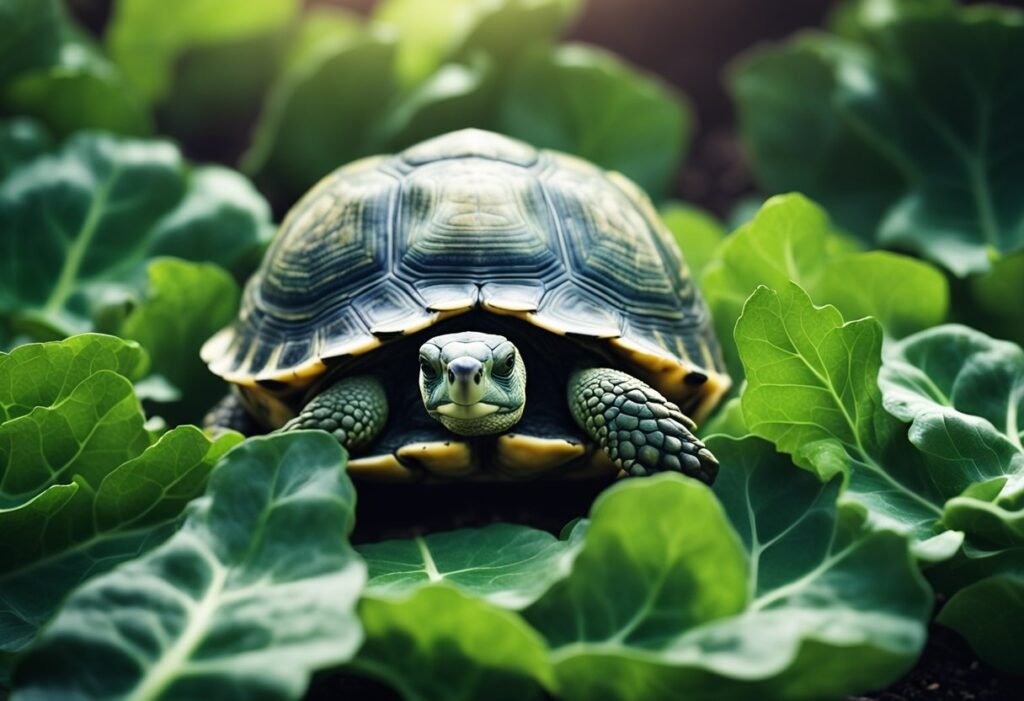
Collard greens are a nutritious leafy green vegetable that can be a great addition to a tortoise’s diet. They are low in calories and high in fiber, vitamins, and minerals.
One cup of cooked collard greens contains:
- Calories: 49
- Fiber: 5 grams
- Protein: 4 grams
- Fat: 1 gram
- Vitamin A: 308% of the Daily Value (DV)
- Vitamin C: 58% of the DV
- Vitamin K: 1,045% of the DV
- Calcium: 27% of the DV
- Iron: 6% of the DV
- Potassium: 10% of the DV
Collard greens are particularly high in vitamin K, which is important for bone health and blood clotting. They are also a good source of vitamin A, which is important for vision and immune function, and vitamin C, which is important for immune function and skin health.
In addition to vitamins and minerals, collard greens contain phytonutrients, such as flavonoids and carotenoids, which have antioxidant and anti-inflammatory properties.
When feeding collard greens to your tortoise, it is important to wash them thoroughly and remove any tough stems or ribs. It is also important to feed them in moderation, as too much can cause digestive issues. As with any new food, it is best to introduce collard greens slowly and monitor your tortoise’s reaction.
Can Tortoises Eat Collard Greens?
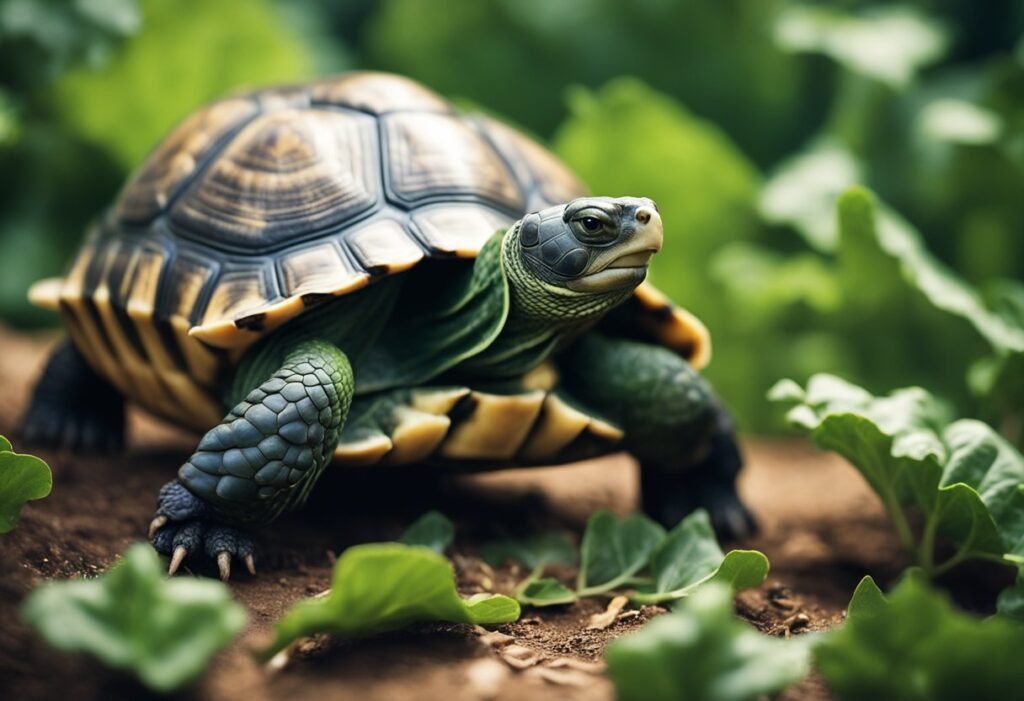
Collard greens are a popular leafy vegetable that is packed with nutrients and vitamins. Many people wonder if it is safe to feed collard greens to their tortoises. In short, the answer is yes, tortoises can eat collard greens, but it should be done in moderation.
Collard greens are high in calcium, which is essential for the growth and development of tortoises. They also contain vitamins A and C, which are important for maintaining a healthy immune system. However, collard greens are also high in oxalates, which can bind to calcium and prevent it from being absorbed by the tortoise’s body.
When feeding collard greens to your tortoise, it is important to remember to wash them thoroughly to remove any pesticides or other chemicals. It is also important to feed them in moderation, as too much can lead to health problems such as kidney stones.
In addition to collard greens, tortoises should be fed a variety of other vegetables, fruits, and greens to ensure they are getting a well-balanced diet. It is also important to provide your tortoise with access to fresh water at all times.
Overall, collard greens can be a healthy addition to your tortoise’s diet when fed in moderation and as part of a well-balanced diet.
Benefits of Collard Greens for Tortoises
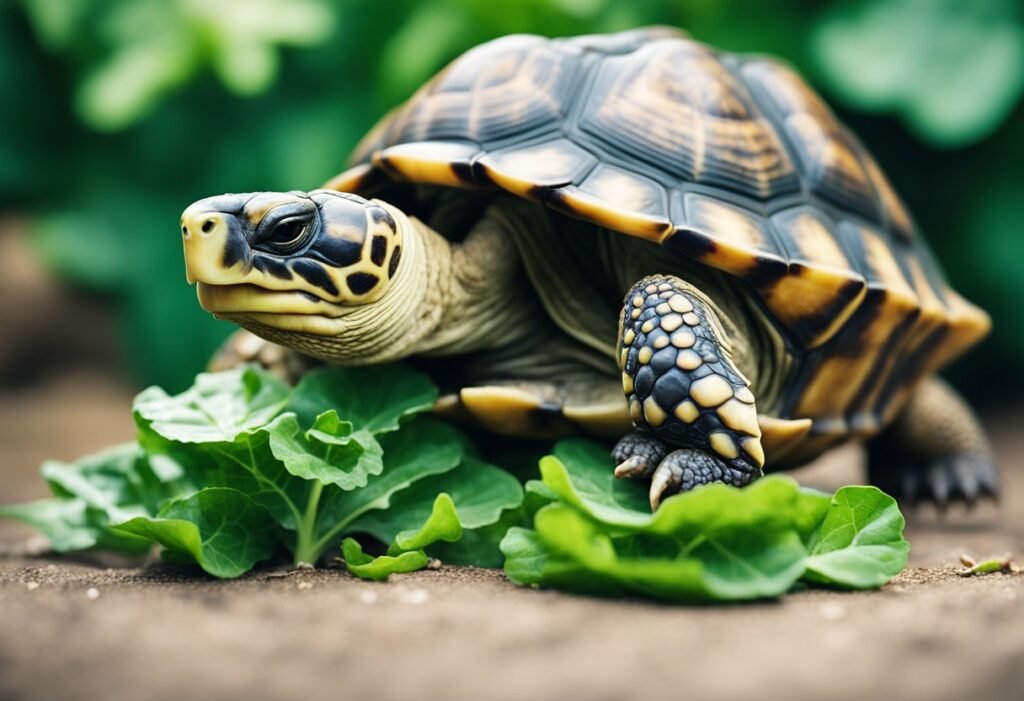
Collard greens are a nutritious vegetable that can provide several benefits to tortoises. Here are some of the benefits of collard greens for tortoises:
- High in Fiber: Collard greens are a great source of fiber, which is essential for maintaining healthy digestion in tortoises. The high fiber content can also help prevent constipation and other digestive problems.
- Rich in Vitamins and Minerals: Collard greens are packed with vitamins and minerals that are important for the overall health of tortoises. They are particularly high in vitamin A, vitamin C, and calcium, which are all essential for strong bones and a healthy immune system.
- Low in Oxalates: Unlike other leafy greens, collard greens are low in oxalates, which can interfere with calcium absorption in tortoises. This makes collard greens a great choice for tortoises that need to maintain a healthy calcium balance.
- Easy to Digest: Collard greens are easy for tortoises to digest, which means they can be a great addition to their diet. They are also low in fat and calories, which makes them a healthy choice for tortoises that need to maintain a healthy weight.
Overall, collard greens can provide several health benefits for tortoises. However, it is important to remember that they should be fed in moderation and as part of a balanced diet that includes a variety of other vegetables and fruits.
How to Feed Collard Greens to Tortoises
Collard greens are a nutritious and tasty food for tortoises. However, it is important to prepare and feed them properly to ensure that your tortoise receives the maximum nutritional benefit.
Preparation
Before feeding collard greens to your tortoise, you should ensure that they are thoroughly washed to remove any dirt or pesticides. It is also recommended to chop them into small pieces to make them easier for your tortoise to eat.
Frequency
Collard greens can be fed to your tortoise once or twice a week as part of a balanced diet. It is important to remember that tortoises require a variety of foods to maintain good health, so collard greens should not be the sole component of their diet.
In addition, you should monitor your tortoise’s weight and adjust their feeding schedule accordingly. Overfeeding collard greens can lead to obesity and other health issues.
Overall, collard greens can be a healthy and delicious addition to your tortoise’s diet when fed in moderation and prepared properly.
Potential Risks of Feeding Collard Greens to Tortoises
When it comes to feeding collard greens to tortoises, there are a few potential risks that we need to be aware of. While collard greens can be a nutritious addition to a tortoise’s diet, there are some things to keep in mind to ensure that your pet stays healthy.
Firstly, collard greens contain a high amount of calcium. While calcium is an essential nutrient for tortoises, excessive amounts can lead to health problems such as bladder stones or metabolic bone disease. Therefore, it is important to feed collard greens in moderation and ensure that your tortoise is receiving a balanced diet.
Secondly, collard greens contain a compound called oxalates, which can bind to calcium and prevent its absorption. This can lead to calcium deficiency and other health issues. To minimize the risk of oxalate-related problems, it is recommended to feed collard greens in combination with other calcium-rich foods, such as calcium supplements or other leafy greens.
Lastly, collard greens can sometimes be contaminated with harmful pesticides or other chemicals. To avoid this, it is best to purchase organic collard greens or wash them thoroughly before feeding them to your tortoise.
Overall, while collard greens can be a healthy addition to a tortoise’s diet, it is important to be aware of the potential risks and feed them in moderation. By doing so, you can ensure that your pet stays healthy and happy.
Alternative Foods for Tortoises
As we mentioned earlier, collard greens are a great source of nutrition for tortoises. However, it is important to provide a variety of foods to ensure a well-rounded diet for your pet.
Here are some alternative foods that you can offer to your tortoise:
- Leafy greens: Other leafy greens that are safe for tortoises to eat include kale, dandelion greens, mustard greens, and turnip greens. These greens are also rich in vitamins and minerals that are essential for your tortoise’s health.
- Vegetables: Vegetables such as carrots, squash, and sweet potatoes are also great for tortoises. These vegetables are high in fiber and contain important vitamins and minerals.
- Fruits: Fruits such as apples, berries, and melons can be offered as treats to your tortoise. However, it is important to remember that fruits are high in sugar and should be given in moderation.
- Commercial Tortoise Food: Commercial tortoise food can also be offered to your pet. These foods are specifically formulated to provide a balanced diet for tortoises. However, it is important to read the ingredients list to ensure that the food does not contain any harmful additives or preservatives.
Remember to always research before feeding your tortoise any new food and consult with a veterinarian if you have any concerns about your pet’s diet.
Conclusion
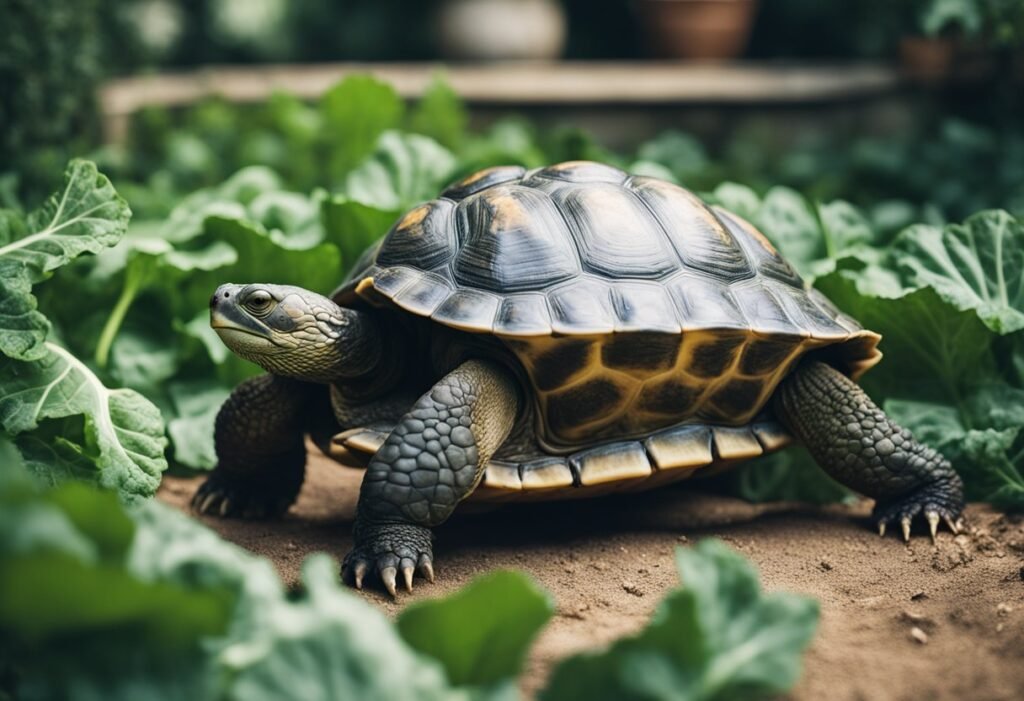
In conclusion, collard greens are a nutritious food that can be included in a tortoise’s diet. However, they should not be relied upon as the sole source of nutrition. It is important to provide a varied diet that includes a mix of vegetables, fruits, and protein sources.
When feeding collard greens to your tortoise, it is important to wash them thoroughly to remove any pesticides or harmful bacteria. We recommend offering collard greens in moderation, as they are high in calcium and oxalates, which can cause health problems if consumed in excess.
Overall, collard greens can be a healthy addition to your tortoise’s diet when offered in moderation and as part of a balanced diet. As with any new food, it is important to introduce collard greens slowly and monitor your tortoise’s reaction to ensure they are tolerating it well.
Frequently Asked Questions
What vegetables are safe for tortoises to eat?
Tortoises are herbivores and require a diet that is high in fiber and low in protein. Safe vegetables to feed your tortoise include dark leafy greens, such as collard greens, kale, and mustard greens, as well as carrots, squash, and bell peppers.
What are some of the best greens for tortoises?
Some of the best greens for tortoises include dandelion greens, endive, escarole, and collard greens. These greens are high in fiber and provide essential vitamins and minerals for your tortoise.
Are collard greens a good choice for tortoises?
Yes, collard greens are a great choice for tortoises. They are high in calcium, fiber, and vitamins A and C. However, it’s important to feed collard greens in moderation, as too much can cause digestive problems.
What fruits can tortoises eat?
Tortoises can eat a variety of fruits, including strawberries, raspberries, blueberries, and melons. However, fruits should be fed in moderation, as they are high in sugar.
What vegetables should tortoises avoid?
Tortoises should avoid vegetables that are high in oxalates, such as spinach and beet greens. These vegetables can bind to calcium and prevent its absorption, which can lead to health problems.
Why is kale not recommended for tortoises?
Kale is not recommended for tortoises because it is high in oxalates, which can lead to health problems. Additionally, kale is high in goitrogens, which can interfere with thyroid function.





